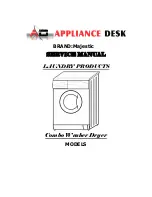
2
GB
This appliance was designed and
manufactured in compliance with international
safety standards. The following information has
been provided for safety reasons and should
be read carefully.
Keep this instruction manual in a safe place for
future reference. If the appliance is sold, given
away or moved, make sure the manual is kept
with the machine.
Read the instructions carefully, as they include
important information on safe installation, use
and maintenance.
This appliance was designed for domestic use
or similar applications, for example:
- use by guests in hotels, motels and other
residential settings;
- bed & breakfasts.
Remove the appliance from all packaging
and make sure it was not damaged during
transportation. If it was damaged, contact the
retailer and do not proceed any further with
the installation process.
General safety
•
This appliance should not be operated
by children younger than 8 years, people
with reduced physical, sensory or mental
capacities, or inexperienced people who are
not familiar with the product, unless they are
given close supervision or instructions on
how to use it safely and are made aware by
a responsible person of the dangers its use
might entail.
• Children must not play with the appliance.
• It is the user's responsibility to clean and
maintain the appliance. Children should never
clean or maintain it unless they are given
supervision.
• The appliance was designed for domestic
use inside the home and is not intended for
commercial or industrial use.
• The appliance must be used to wash domestic
crockery in accordance with the instructions
in this manual.
• The appliance must not be installed outdoors,
even in covered areas. It is extremely
dangerous to leave the machine exposed to
rain and storms.
• Do not touch the appliance when barefoot.
• When unplugging the appliance always pull
the plug from the mains socket. Do not pull on
the cable.
• The water supply tap must be shut off and the
plug should be removed from the electrical
socket at the end of every cycle and before
cleaning the appliance or carrying out any
maintenance work.
• The maximum number of place settings is
shown in the product sheet.
• If the appliance breaks down, do not under
any circumstances touch the internal parts in
an attempt to perform the repair work yourself.
• Do not lean or sit on the open door: this may
cause the appliance to overturn.
• The door should not be left open as it may
create a dangerous obstacle.
• Keep detergent and rinse aid out of reach of
children.
• The packaging material should not be used
as a toy.
• Knives and other utensils with sharp edges
must be placed either with the points/blades
facing downwards in the cutlery basket or
horizontally on the tip-up compartments or in
the tray/third basket, if available.
• Connect the appliance to the water mains
using the new supply hose provided with the
appliance. Do not re-use the old hose.
• Install the back side of a free-standing
dishwasher against a wall.
Disposal
•
To dispose of any packaging materials, follow
local legislation so that the packagings may
be reused.
• The European Directive 2012/19/EU relating
to Waste Electrical and Electronic Equipment
(WEEE) states that household appliances
should not be disposed of using the normal
solid urban waste cycle. Exhausted appliances
should be collected separately in order to
optimise the cost of reusing and recycling the
materials inside the machine, while preventing
potential damage to the atmosphere and
public health. The crossed-out dustbin symbol
shown on all products reminds the owners of
their obligations regarding separated waste
collection.
For further information relating to the correct
disposal of household appliances, owners
may contact the relevant public authority or
the local appliance dealer.
Saving energy and respecting the
environment
Saving water and energy
•
Only begin a wash cycle when the dishwasher
is full. While waiting for the dishwasher to be
filled, prevent unpleasant odours with the Soak
cycle
(if available, see Wash Cycles).
• Select a wash cycle that is suited to the type of
crockery and to the soil level using the Table
of Wash Cycles:
- For dishes with a normal soil level, use the
Eco wash cycle, which guarantees low energy
and water consumption levels.
- If the load is smaller than usual activate the
Half Load option
(see Special wash cycles and
options, if available)
.
• If your electricity supply contract gives details
of electricity-saving time bands, run the wash
cycles when electricity prices are lower. The
Delayed Start option can help you organise
the wash cycles accordingly
(see Special wash
cycles and options, if available).
Precautions and advice


































